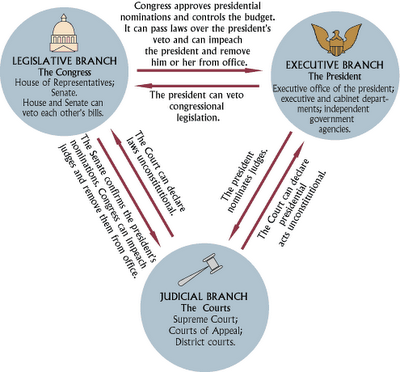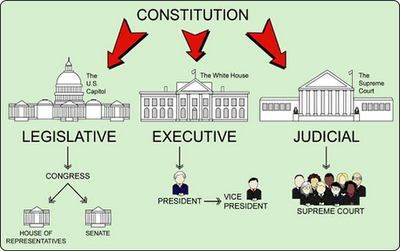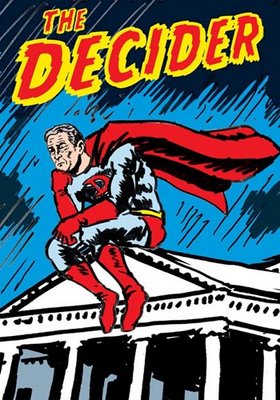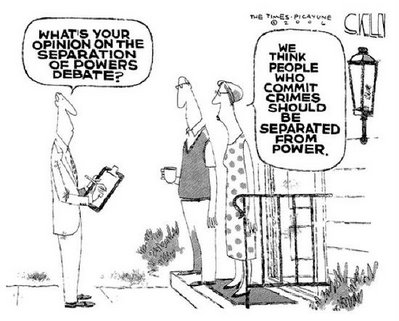The Myth of Checks and Balances
by
Bevin Chu
by Bevin Chu
One of the most pernicious myths about democracies, and it pains me to say, even constitutional republics, is the Myth of Checks and Balances.
Most of us were indoctrinated with this myth in junior high school and high school social studies class. I know I was.
According to this myth, also known as the Doctrine of the Separation of Powers, distributing the powers of a government among several branches prevents the undue concentration of power in any single branch.
As the Encyclopedia Britannica explains:
[The Separation of Powers is the] division of the legislative, executive, and judicial functions of government among separate and independent bodies. Such a separation limits the possibility of arbitrary excesses by government, since the sanction of all three branches is required for the making, executing, and administering of laws. The concept received its first modern formulation in the work of Baron de Montesquieu, who declared it the best way to safeguard liberty; he influenced the framers of the Constitution of the United States, who in turn influenced the writers of 19th- and 20th-century constitutions. See also checks and balances.

Google Images search: Separation of Powers



The Myth Exposed
Unfortunately political systems in the real world do not function as illustrated in these diagrams.
Unfortunately the division of the functions of government into legislative, executive, and judicial branches does not prevent arbitrary excesses by government.
Unfortunately "separating the powers" doesn't really separate the powers, and doesn't really result in "separate and independence bodies checking and balancing each other."
The Separation is Illusory, The Power is Real
The reason why is not mysterious. The reason why is quite simple.
The reason why "separating the powers" doesn't result in separate and independent bodies checking and balancing each other, is that the separation is not real. The separation is illusory. The separation is nothing more than wishful thinking.
In fact the "separate and independent bodies" remain inseparable parts of the same government, the one government, the only government that the limited government, "minarchist" paradigm permits within any given jurisdiction.
This government perpetuates its existence by robbing individuals at gunpoint. It refers to these acts of armed robbery as "taxation," as if calling its crime by some other name absolved it of guilt.
As an old joke has it, "The only difference between the Mafia and the government is a flag." The joke is funny because it is true.
Every member of an organized crime family lives off the same protection money extorted at gunpoint from hapless shopkeepers and working men unfortunate enough to live within the crime family's reach.
In what sense can the bosses, underbosses, consiglieri, and soldiers of the same crime family be considered "separate and independent" from each other?
By the same token, every official of a monopolistic state lives off the same tax revenues extorted at gunpoint from hapless "taxpayers" unfortunate enough to live within the government's reach.
In what sense can members of such a criminal enterprise be considered "separate and independent" from each other?
Can we really expect officials who are part of such a criminal enterprise not to perceive each other as fellow predators, and us, the taxpayers, as their common prey?
Can we really expect officials who are part of such a criminal enterprise not to perceive each other as members of the same pack of wolves, and us, the taxpayers, as members of the same flock of sheep?
Can we really expect officials who are part of such a criminal enterprise to perceive each other as natural enemies and therefore check and balance each other?
Resistance against such a unified "crime family with a flag" is virtually impossible. The proximate reason is that it has more goons with guns. But the ultimate reason is that the overwhelming majority of citizens in "advanced nations" believe they can't live without a monopolistic state, and their collective behavior perpetuates its existence.
Citizens who believe they can't live without a monopolistic state are the political counterpart of battered wives, who believe they can't live without their abusive husbands, and who insist that "deep down" their abusers "really love them."
The difference is that a battered wife who rationalizes away her husband's abusive treatment of her victimizes only herself.
Citizens who believe in and demand the perpetuation of monopolistic states victimize not only themselves, but also fellow citizens who know better.

The Godfather (1972, directed by Francis Ford Coppola, written
by Mario Puzo)
Michael Corleone: My father is no different than any powerful man, any man with power, like a president or senator.
Kay Adams: Do you know how na´ve you sound, Michael? Presidents and senators don't have men killed.
Michael Corleone: Oh. Who's being na´ve, Kay?
Why the Executive Branch always becomes The Government
In theory, a democratically elected president is merely the highest-ranking official in one of three or more coequal branches of government, the executive branch.
In reality, in any monopolistic state with a presidential system, the president is an elective dictator, the legislature is a debating society, and the judiciary is a rubber stamp. Real world experience has demonstrated that over time, the executive invariably co-opts the judiciary and marginalizes the legislature.
In theory, the coequal branches of government provide "checks and balances" upon each other, preventing them from ganging up upon the individual citizens they have sworn to protect and serve.
In reality, because the executive is the branch that has been delegated the power to "execute" policy (pun intended), it invariably usurps any and all powers delegated to the other branches of a monopolistic state. Real world experience has shown that "limited government" inevitably morphs into unlimited government, and that the executive is always the branch that winds up monopolizing that limitless power. It makes no difference whether the executive was popularly elected, self-appointed, or hereditary.
As George W. Bush put it quite bluntly, "I'm the decider and I decide what's best."

The
Decider: Bush as Superman, by R. Sikoryak
Baron de Montesquieu was dead right when he noted that there can be no liberty where the legislative and executive powers are united in the same person, or body of magistrates or if the power of judging is not separated from the legislative and executive powers.
James Madison was dead right when he noted that the accumulation of all powers, legislative, executive, and judiciary, in the same hands, whether of one, a few, or many, and whether hereditary, self-appointed, or elective, may justly be pronounced the very definition of tyranny.
Montesquieu and Madison unfortunately, were dead wrong about how far mankind would have to go to prevent the uniting and accumulation of all powers in the same hands.
Montesquieu and Madison earnestly believed that establishing constitutional republics with tripartite divisions of powers would be sufficient.
Given their historical context, Montesquieu and Madison's failure to champion market anarchism was understandable. The history of medieval Iceland had been lost to mainstream political awareness.
Montesquieu and Madison did not realize that only a market anarchist system, featuring voluntarily funded Private Defense Agencies (PDAs), vigorously competing against each other in the open market place, could ensure a genuine separation of powers and provide genuine checks and balances against tyranny.
A Thought Experiment
To better understand why the "separation of powers" doesn't really result in "separate branches of government" checking and balancing each other," let's try a little thought experiment.
Believers in Big Government, particularly self-styled "champions of democracy," love to portray government as a "public service," and government officials as "public servants."
Market anarchists know this is nonsense, but let's pretend we buy this "service provider" nonsense for the moment, and see where it leads.
Let's say for the sake of argument that government is a service provider, and that the service it provides is the use of force, specifically, a military to defend against foreign invaders, police to protect against domestic criminals, and a court system to adjudicate legal disputes.
Now suppose that instead of military, police, and courts, the service or product provided is computer software and software support services.
How many netizens would accept an arrangement in which a single software company, say Microsoft, would be granted a territorial monopoly in the provision of computer software and software support services where they live? In other words, no other company would be permitted to provide computer software and software support services, only Microsoft.
How many netizens would be mollified by solemn assurances from founder Bill Gates that Microsoft's exclusive franchise would not result in arbitrary excesses because the Microsoft corporation would be divided into three "separate and independent" divisions, each charged with different functions?
One division would be in charge of formulating Microsoft policy. Another division would be charge of executing Microsoft policy. Another division would be in charge of verifying whether the Microsoft policy being formulated and executed was in conformance with the Microsoft company charter.
How many netizens would trust such an arrangement to ensure that Microsoft would deliver well-coded software at competitive market prices?
Wouldn't they scream their heads off, insisting that Microsoft as a de facto monopoly is already sitting on its behind, doling out bug-ridden bloatware behind schedule at exorbitant prices, and that as a de jure monopoly it would be infinitely worse?
And wouldn't they be right?
See: What's so Bad about Microsoft?
So why don't they scream as loud or even louder about the government's de jure monopoly in the use of brute force?
After all, Microsoft may be able to flood the market with overpriced, bug-ridden bloatware, but it certainly can't force us to buy it. It can't compel us to upgrade to Windows Vista upon threat of arrest and imprisonment, at least not without favoritism from a monopolistic state.
Contrast this with so-called democratic governments, which have been empowered by self-styled "champions of freedom and human rights" to compel us to subscribe to its products and services – or else.
A Reluctant Anarchist
I never wanted to become an anarchist, even a free market anarchist. I wanted to remain a constitutional republican in the tradition of the French Physiocrats, the British Classical Liberals, and the American Founding Fathers.
I became an advocate of market anarchism reluctantly, after concluding that the limited government "minarchist" paradigm simply does not work as advertised.
Until three years ago, around 2004, I still held out hope that Checks and Balances would in fact check and balance, and that the Doctrine of the Separation of Powers would be vindicated.
Political evolution, or rather, devolution within the American Imperium of Bill Clinton and George W. Bush; and within the Taiwanese kleptocracy of Lee Teng-hui and Chen Shui-bian, disabused me of any such hopes.
The harsh reality is that the Doctrine of the Separation of Powers, within the context of a monopolistic state, is a contradiction in terms.
The harsh reality is that as long as a nation is ruled by a conventional monopolistic state rather than Private Defense Agencies, any allegedly "separate and independent branches" of government will always perceive themselves as integral parts of the same government, the one government, the only government within any given jurisdiction.
No matter how one attempts to divide a monopolistic state into "branches" the reality is that all such "branches" live off the same "tax revenues," better known as protection money, extracted by force from "taxpayers," better known as victims of extortion.
The Separation of Powers was supposed to be the primary firewall between constitutional republicanism and democracy. Tragically it has proven to be inadequate. Given enough time, it burns right through.
Constitutional republicanism is unquestionably superior to democracy. Unfortunately, that's just not good enough. Constitutional republicanism, given enough time, degenerates into democracy, aka elective dictatorship.
Democracy meanwhile, takes no time at all to degenerate into dictatorship. That's because democracy isn't separated from dictatorship by any firewalls whatsoever. That's because democracy is a form of dictatorship. It always was, and it always will be.

A
terrific political cartoon. But an even better caption would be: "We
think people should be separated from power so that they can't
commit crimes."
It is high time defenders of natural rights and individual liberty forsook their irrational attachment to that discredited system known as "limited government." Limited government never remains limited. It always becomes unlimited.
As long as a government, any government, wields a legal monopoly in the use of brute force within a given territorial jurisdiction, that government's powers can never really be separate.
It is high time aspiring nation builders began drafting constitutions predicated on a system that truly separates the powers – free market anarchism.
March 2, 2007
Bevin Chu [send him mail] is an American architect of Chinese descent registered to practice in Texas. Currently living and working in Taiwan, Chu is the son of a retired high-ranking diplomat with the ROC (Taiwan) government. His column, "The Strait Scoop" is published on his website, The China Desk.
